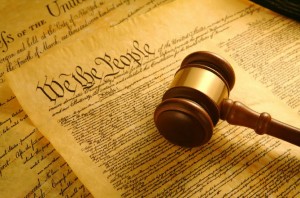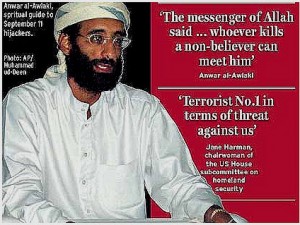In light of the killing of Awlaki in Yemen yesterday, an American citizen, there are some who are pointing to the Constitution’s 5th  Amendment and crying foul. Certainly this must be considered and to do so, we must first look AT that amendment.
Amendment and crying foul. Certainly this must be considered and to do so, we must first look AT that amendment.
“No person shall be held to answer for a capital, or otherwise infamous crime, unless on a presentment or indictment of a Grand Jury, except in cases arising in the land or naval forces, or in the Militia, when in actual service in time of War or public danger; nor shall any person be subject for the same offense to be twice put in jeopardy of life or limb; nor shall be compelled in any criminal case to be a witness against himself, nor be deprived of life, liberty, or property, without due process of law; nor shall private property be taken for public use, without just compensation.”
Okay.
Was Awlaki relieved of private property, taken for public use, without just compensation?
No.
Was Awlaki subject for the same offense twice put in jeopardy of life or limb?
No.
Was Awlaki held to answer for a capitol, or otherwise infamous crime?
Yes.
Was Awlaki presented an indictment of a grand jury?
No.
Was Awlaki’s “case” arising in the land or naval forces, or in the militia, when in actual service in the time of war or public danger?
Ahhhhh…That’s the rub.
Awlaki was indeed an American citizen. Nobody is arguing that. He was born in New Mexico and lived most of his life in these United States.
While he was NOT in the service of OUR country, or arguably any OTHER country at the time of his terrorist conduct, he WAS without question engaging in actions of war AGAINST our nation and our, his…fellow citizens.
What we really have here is a question of conduct and not just in the sense of right or wrong.
Were his activities, as a terrorist, perpetrated against the United States, a law enforcement issue or were they a military issue?
 I would suggest his actions were carried out under al Qaeda’s declaration of war against the United States – and as Awlaki was acting on behalf OF al Qaeda, the issue was that of a military nature rather than of a law enforcement nature.
I would suggest his actions were carried out under al Qaeda’s declaration of war against the United States – and as Awlaki was acting on behalf OF al Qaeda, the issue was that of a military nature rather than of a law enforcement nature.
Does our military have the authority to kill the enemy in war? Of course they do. If they did not have that authority, then what is our military for to begin with?
The Military operated, in the case of Awlaki, acted within their scope when they fired Hellfire missiles on the car in which he was riding.
Clearly, the 5th amendment is not the only part of the Constitution which must be consulted in the demise of Awlaki.
It is Section 3 of the constitution which deals with treason.
“Treason against the United States, shall consist only in levying War against them, or adhering to their enemies, giving them Aid and Comfort. No Person shall be convicted of Treason unless on the Testimony of two Witnesses to the same overt act, or on confession in open court.”
“The Congress shall have Power to declare the Punishment of Treason, but no Attainder of Treason shall work Corruption of Blood, or forfeiture except during the Life of the Person attainted.”
Okay, let’s take that last part first. What exactly does that mean?
In a nutshell, it means that Congress can declare the punishment for treason but no punishment can be handed down to relatives of the person guilty of the offense.
As for the first part…
Did Awlaki levy war against the United States?
Yes.
Did Awlaki adhere to our enemies?
Yes.
Was there testimony of two witnesses to the same overt act?
Arguably yes. Many officials were plenty aware of Awlaki’s contact with 3 of the 9-11 hijackers and clearly, through email records and other statements, more than two people were plenty aware of his direct contact with the underwear bomber, the Time’s Square bomber (an attack which failed) and with the Fort Hood Shooter.
So, was Awlaki guilty of treason?
This is a grey area as there was never a trial and Awlaki was never found formally guilty in court but it would be perhaps the greatest stretch of reality to claim that because he never appeared in court he was not guilty of treason…and traditionally, the penalty for treason is death.
Let’s now place all of this into a different context.
Had we seen, during WWII, Hitler riding in a car, would we not have been within our authority, during a time of war, to kill him? Of course we would. The obvious difference is that Hitler was not a U.S. citizen. Okay. If a U.S. citizen, on the battlefield started killing our own troops, would our military not have been within their authority to kill that person? Again the answer is, of course we would.
Awlaki was a citizen of the U.S. and was acting in consort with our enemies and as the leader of al Qaeda in the Arabian Peninsula, he held a position of power in the waging of war against America and our allies. While he never appeared in court to face charges of treason he was clearly guilty of it and our military in concert with the CIA took him out.
Does this mean that the President has the authority to do the same thing, let’s say, to an identified U.S. citizen, identified as a terrorist, who is riding down the road on a U.S. highway?
The glaring difference would have to be that in THIS country, we have many more options available. While I do not believe it to be a law enforcement issue but a military one, even so, various elements of law enforcement, local, state and or federal, here, could be employed to capture, or if need be, kill said terrorist.
In a road in Yemen, we simply do not have those options available and when one considers the difficulty of even finding the wanted individual, time is of the essence. Once identified, the options are scant and action must be taken. That is precisely what happened.
Yemeni officials discovered his place of hiding, surveillance was issued, the target was on the move and rather than risk losing Awlaki, he was eliminated.
Finally, is it right to question such a move and the constitutionality of it?
Of course it is and, while I am not a constitutional attorney, I have a hard time discerning the outcome of a constitutional challenge on this issue. Clearly there seem to be some grey areas and the Constitution must be strictly adhered to at all times. Just as clearly, Awlaki was at war with the U.S. and therefore treasonous.
Is a constitutional amendment in order?
I don’t believe so but a clear definition of rules of engagement is. There are plenty of precedents for this action not the least of which would be our own civil war. Were not those killed in that war U.S citizens engaged in war against the union?
Yes.
Did George Washington violate the Constitution in quelling the Whiskey Rebellion?
No.
If this action goes to the U.S. Supreme Court and is found to be constitutional, and I believe it would be found as such, there will be those who will continue to claim otherwise but in doing so, they would be placing our nation and our lives at risk by making the prosecution of war a court case.
What SHOULD have been done. some time ago, or at the very least by Obama before issuing the kill or capture order, was to rescind Awlaki’s citizenship at which point, the issue now at hand would be non existent.
Awlaki, upon deciding to become a part of al Qaeda, also made the decision to become the enemy in war and in war, we do not send lawyers, we send the military. We, in war, do not sent subpoenas, we send hellfire missiles. In war we do not read the enemy their rights, we read them their last rites.
Awlaki was the enemy.
Awlaki was sent hellfire missiles.
May he rest in pieces.





NO. This is the result of many decisions he made. In his mindset, we did him a favor by helping him attain his 72 virgins. He left this country to join and lead people to fight and kill ours. Ultimately, in a strange way to us, we became helpers to him as to attaining martyrdom and getting his promised virgins and fulfilling his dream. We can only guesstimate how many of our young men and women lives we may have saved. Sometimes, we just have to accept that we should not impose our ways and beliefs on people who do not want them and stop creating safe havens and controversy about what are non issues to them. Don’t we have enough on our plate???
TITLE 18 > PART I > CHAPTER 115 > § 2381
Prev | Next
§ 2381. TREASON
How Current is This?
Whoever, owing allegiance to the United States, levies war against them or adheres to their enemies, giving them aid and comfort within the United States or elsewhere, is guilty of treason and shall suffer death, or shall be imprisoned not less than five years and fined under this title but not less than $10,000; and shall be incapable of holding any office under the United States.
This reflects the Laws as passed by Congress as of Feb 1, 2010.